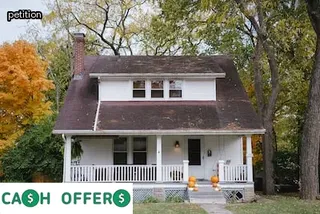The process of selling an inherited house in Oregon can be a difficult one, especially if the owner isn't familiar with the state's estate laws and probate process. Understanding these rules is essential to ensure that all steps are taken correctly throughout the entire sale procedure.
The probate sale process begins with filing a petition in court - this document will ask for permission to manage the deceased person's estate, which includes their home. After approval by a judge, a personal representative will be appointed to take responsibility for managing and distributing assets from the estate.
In order to complete the sale of an inherited house, a variety of paperwork needs to be filled out and submitted as part of the probate process. Depending on whether or not there is a will involved, other documents may need to be obtained such as tax forms and death certificates.
Additionally, it's important to understand that each county has its own set of laws when it comes to probate sales; consulting with an attorney familiar with Oregon law can help make sure that everything goes smoothly during the process.

Selling an inherited house during probate in Oregon may seem intimidating and complicated, but it can be advantageous if done correctly. A primary benefit of selling during the probate process is that heirs don't have to take on any debt associated with the property before it's sold, since creditors are paid out of the estate before distributions are made.
Additionally, selling quickly avoids carrying costs like property taxes and insurance, which can become a financial burden. On the other hand, selling a house during probate in Oregon can be disadvantageous as well.
It may take longer to close than a traditional sale due to additional paperwork required by the court and executor. Also, there may be restrictions on how much of an offer you can accept without court approval or what repairs must be made prior to closing.
Understanding Oregon estate laws and the probate process is key when considering whether or not to sell an inherited home in this state.
In Oregon, the probate sale of real estate typically involves several steps that must be completed by the executor or personal representative of an estate. Generally, the first step is to open an estate and begin the probate process.
This can be done by filing a petition with the local court to start probate proceedings. The second step is to obtain Letters Testamentary, which are issued by the court and give the executor authority to act on behalf of the deceased's estate.
Once Letters Testamentary have been obtained, it becomes necessary to identify and notify all interested parties of the pending sale. After giving notice to those who may have an interest in the property, a court hearing must be held where any objections can be presented.
If no objections are raised during this hearing, then a realtor can be hired and listed as an agent for selling the inherited house in Oregon. Finally, once any offers have been accepted, closing documents must be prepared and signed before ownership is transferred from the deceased's estate to its new owner.

When selling a probate house in Oregon, there are certain strategies you can use to make the process easier. Understanding estate laws and the probate process is key to ensuring that your sale goes smoothly.
It is important to be aware of the deadlines for submitting paperwork and paying any debts or taxes associated with the estate. Make sure you understand Oregon's inheritance tax laws, which may require payment of taxes on inherited property prior to transferring ownership to a new owner.
You should also consider hiring an experienced real estate attorney who can help navigate the legal process and provide guidance throughout the transaction. Additionally, it may be beneficial to hire an appraiser who can accurately assess the value of the property, as well as a home inspector who can identify any necessary repairs or upgrades that may need to be made before putting the home on the market.
Taking these steps will help ensure that your sale goes smoothly and that you receive maximum value for your inherited property.
When a real estate property is inherited in Oregon, the executor of the estate must determine who has authority to sell it. The probate process begins with filing a Petition for Probate with the Circuit Court in the county where the deceased person resided at the time of their death.
This petition names an executor or personal representative of the estate who will be responsible for administering and distributing assets according to Oregon’s laws and statutes. Estate administration requires that all potential heirs be notified of probate proceedings, including any creditors of the decedent.
Once all legal requirements have been met, the executor can begin to distribute assets as directed by Oregon state law. In terms of selling inherited real estate, Oregon probate law states that only an appointed executor or court-appointed administrator has authority to do so.
This individual will need to obtain court approval for any sale prior to finalizing it. Additionally, notice must be given to all interested parties prior to closing on any sale.
By understanding Oregon’s estate laws and probate process, individuals can safely navigate selling an inherited house in Oregon.

When selling an inherited property in Oregon, it is important to understand the local state estate laws and probate process, as well as the applicable taxes. In Oregon, there are two primary taxes that may be applicable to a probate property sale: inheritance tax and real estate transfer tax.
Inheritance tax is based on who inherits the property and can range from 0% up to 10%. Real estate transfer tax is a flat rate of 1.
5%, which applies to any real estate transfers over $125,000. It is important to note that while these taxes are required by law, they may not always apply; for example, if the decedent was domiciled outside of Oregon or if all heirs choose to waive their rights then inheritance tax will not apply.
Therefore it is essential for sellers to research their options and consult with a local professional before making any decisions regarding an inherited property sale in Oregon.
In Oregon, if you die with a valid Will in place, it means that your wishes regarding the division of your estate will be carried out according to the terms of your Will. The probate process is a legal procedure that ensures the validity of the Will and authenticates its provisions.
During this process, an executor is appointed by the court to handle matters related to the deceased's estate. The executor is responsible for distributing assets and property according to the instructions stated in the Will.
Additionally, in Oregon, all testators must adhere to certain laws when drafting and executing their Wills. These include requirements such as making sure that all beneficiaries are named explicitly within the document and ensuring that any gifts or bequests are properly signed and dated.
Moreover, estate taxes may need to be paid depending on the size of an individual's estate. Furthermore, if you have recently inherited an Oregon house after someone has died with a valid Will, then it is important to understand both state laws regarding inheritance as well as probate processes so you can properly manage any real estate transactions in accordance with those laws.

In Oregon, if a person dies without leaving a will, they are considered to have died intestate. This means that the state will determine how their estate is distributed and who inherits their assets.
Generally, in an intestate situation, the property will be divided among surviving family members in accordance with the laws of Oregon. In order for an estate to pass to heirs without a will, certain requirements must first be met.
First, all creditors must be paid from the estate before any assets can be distributed. Second, all beneficiaries must agree on how the estate should be divided or go through a probate process overseen by the court.
Finally, any taxes owed by the deceased must also be paid before any assets can be distributed. In some cases, there may also be other requirements that must be met in order for an inheritance to pass without a will in Oregon.
It is important for anyone selling an inherited house in Oregon to understand these requirements and consider seeking legal advice if necessary to ensure all paperwork is properly completed and all obligations are satisfied prior to distributing any assets from the deceased's estate.
In Oregon, the rights of spouses during an inheritance are protected by law and must be taken into consideration when selling an inherited house. Generally speaking, if a person dies with a surviving spouse, the spouse is entitled to a portion of the deceased’s estate regardless of what is specified in their will.
The surviving spouse can also elect to take a statutory share or “elective share” instead of taking what is specified in the will, which would be determined by Oregon state law. Additionally, if both spouses die together in an accident, the surviving family members may have to go through the probate process before being able to sell any property that was owned jointly.
It is important for those selling an inherited house in Oregon to understand both Oregon estate laws and probate process so they can ensure all legal rights are respected and honored during the sale.

In Oregon, a child's rights during inheritance law proceedings are governed by the state's statutes. Generally, a child is entitled to receive an inheritance from their parent or other relative who has died.
In order for the child to be eligible to receive their inheritance, the estate must go through a probate process. This process begins when the court appoints an executor to administer and distribute the deceased's assets according to Oregon law.
The executor will gather all of the deceased's assets, documents, and debts before filing a petition in court with the county where the decedent resided at the time of death. Upon approval of this petition by the court, the executor can then begin distributing assets according to Oregon law.
During this process, if it is determined that there are minor children involved in inheriting assets from their parent or relative, they must be represented by an attorney as they cannot legally represent themselves in court. The attorney representing them will ensure that their rights are being upheld throughout the proceedings and that they receive any benefits or money due them under Oregon laws governing inheritance law proceedings.
In Oregon, unmarried individuals without children have specific rights regarding the inheritance of property. If they are named as a beneficiary in a will or trust, they are entitled to the property left to them.
If there is no will or trust, Oregon law has specific rules for distributing an estate’s assets. The first step is determining who is legally responsible for administering the estate, known as the executor.
In some cases, it may be up to the probate court to appoint an executor if none has been designated. The executor then must follow all state laws and regulations in distributing the assets of the estate according to Oregon laws on inheritance.
This includes understanding Oregon probate process and filing all necessary paperwork with the court system. When selling an inherited house in Oregon, it is important to understand these laws and take into consideration any applicable federal tax liabilities that may apply before making any decisions about how best to proceed with selling or transferring ownership of a property.

In Oregon, inheriting a house can involve navigating complex legal and financial matters. Depending on the nature of the inheritance, it may be possible to avoid probate entirely.
Oregon allows for non-probate inheritances such as jointly held assets, payable-on-death accounts, transfer-on-death deeds, and trusts. Understanding these options is key to selling an inherited house in Oregon.
Jointly held assets are when two or more people hold a title or deed together; in the event of one owner's death, the surviving owner automatically assumes full ownership of the property. Payable-on-death accounts are bank accounts that name a beneficiary who will receive full account balance upon the account holder's death; this includes money market accounts and certificates of deposits.
Transfer-on-death deeds are similar to joint tenancy but require only one owner; upon death, the property is transferred to designated beneficiary without going through probate court. Lastly, trusts are legal arrangements where a trustee holds title for one or more beneficiaries; this arrangement allows for tax advantages and asset protection that cannot be achieved through joint tenancy or transfer on death deeds.
Exploring all non-probate inheritance options is an important step towards successfully selling an inherited house in Oregon and avoiding costly probate proceedings.
In Oregon, it is important to understand the ways that inheritance laws can be affected by other situations. When selling an inherited house in Oregon, the circumstances of the death and the surviving family members may have an effect on who has the legal right to sell the property.
If there is no will, then the process for determining who inherits the property is known as intestate succession. Additionally, if someone dies and leaves behind a will, there are specific probate laws that must be followed in order for the will to be validated by a court.
In some cases, a conservator or guardian may need to be appointed by the court if a minor inherits property or if someone needs assistance managing their financial affairs due to being incapacitated. Furthermore, if two or more people own a property together through joint tenancy with rights of survivorship, this means that when one person dies their portion of ownership automatically transfers to the other co-owner without going through probate.
It is critical for anyone involved in selling an inherited house in Oregon to familiarize themselves with all applicable laws so they can make sure they are following proper procedures and are taking all necessary steps before closing a sale.

In Oregon, the sale of an inherited house must be done in accordance with state law and the probate process. Heirs to a property must first go through the probate court process which ensures that all legal requirements are met and that any debts or taxes due on the estate are paid.
Once probate is complete, heirs can then sell the house if they wish to do so. In order to legally sell heir property in Oregon, it is important for heirs to understand their rights and responsibilities under state law.
Heirs should also be aware of any transfer fees or other costs associated with selling a house in Oregon, as these can vary depending on the county or municipality in which it is located. Additionally, some counties require additional steps such as obtaining court approval prior to selling heir property in Oregon.
Heirs should consult with an experienced real estate attorney who can help them navigate the estate laws and probate process so they can successfully sell their inherited home.
When selling a property in Oregon that was inherited during probate, the role of the executor is paramount. By law, the executor is responsible for paying all debts and taxes associated with the estate before any assets are distributed.
They also must manage any assets and take care of any other matters associated with the probate process. In addition, they must prepare a proper inventory of all assets to be included in the estate and represent their loved one’s wishes accurately and legally.
As such, it is important to retain an experienced lawyer or attorney who can help ensure that all legal requirements are met and that potential buyers are properly represented. The executor should also be prepared to provide information on the condition of the house—including any necessary repairs or improvements—as well as details on its current market value.
With these considerations in mind, executors can help ensure that any property sale proceeds smoothly while protecting their loved one's legacy.

When inheriting a house in Oregon, it is important to understand the value of the property before selling it through probate. Knowing the real estate market in the area and understanding Oregon estate laws can provide insight into what an inherited property may be worth.
One way to valuate real estate is to get a comparative market analysis (CMA) from a qualified real estate agent. A CMA compares similar properties that have recently been sold.
It also takes into account factors such as location, condition of the property, and current market trends that can affect the home’s value. Additionally, hiring a professional appraiser can provide an objective opinion on how much money could be made from selling an inherited house in Oregon.
The appraiser will take into account comparable properties in the area as well as consider additional details such as construction materials and features of the home. Lastly, potential buyers may offer their own idea of what they would pay for an inherited house in Oregon; this should not be taken into consideration when making any decisions about selling an inherited house through probate in Oregon.
Selling an inherited house in Oregon can be a complex process due to the state's estate laws and probate regulations. Common challenges associated with selling a house before probate is complete in Oregon include difficulties related to title transfers, financial obstacles, and confusion over who has authority to make decisions.
Potential solutions to these issues include consulting local real estate professionals, researching the applicable laws and regulations, and obtaining the necessary documents needed for a successful sale. Maximizing profits during the probate process requires understanding market trends and negotiating with potential buyers.
Additionally, when selling a house through probate it is important to create clear communication between all parties involved and keep good records of all financial transactions. By being aware of the common issues associated with selling a house during probate in Oregon, as well as following some simple tips for a smooth transition, it is possible to successfully sell an inherited property in this state.
When one sibling is living in an inherited property and refuses to sell, it can create a difficult situation for the other siblings who may wish to liquidate their inheritance. In Oregon, the estate laws and probate process dictate how such disputes must be handled.
Generally speaking, if the title of the property is in the deceased's name only, then all of the heirs must agree before any sale can take place. If one heir wishes to force a sale due to a disagreement, they may need to file for partition action in order to do so.
This type of legal action requires all parties involved to appear before a judge and explain why they are seeking to have the asset divided or sold. The judge will render their decision based on what they feel is fair and just considering all relevant information presented.
Depending on the situation, it could be possible for some heirs to buy out those who don't want to sell, but this would require a detailed appraisal of the property and a determination of its value. Ultimately, it's important that all parties understand Oregon estate laws and probate process when facing this type of dilemma so they can make educated decisions regarding how best to move forward with selling an inherited house in Oregon.

Under Oregon law, heirs are the direct relatives of the deceased. This includes spouses and children, but can extend to other family members.
Heirs may also be listed in a will or trust if they were created by the deceased prior to death. In cases where there is no will or trust, Oregon law determines who is entitled to inherit any real estate or assets owned by the deceased.
Generally, assets are distributed to surviving spouses and then divided among lineal descendants (children and grandchildren). If a decedent had no surviving spouse or lineal descendants at the time of death, more distant relatives such as siblings, nieces/nephews, grandparents, etc.
, may be entitled to inherit the property. Heirs should consult with an experienced attorney to better understand their rights under Oregon law when it comes to selling an inherited house.
When you inherit a house in Oregon, there are a few steps that need to be followed in order to ensure that the sale of the home is done legally and properly. Understanding Oregon estate laws and probate process is key to successfully selling an inherited house in Oregon.
The first step of the Oregon probate process is to file a petition with the court. This petition should include all important information, such as the identity of the deceased and their last will or trust if applicable.
After this, an estate administrator will be appointed by the court to manage the process. During this time, creditors must be identified and paid off, assets must be valued and appraised, and taxes must be paid.
Once these steps are completed, any remaining assets can then be distributed according to Oregon law. After all these processes have been taken care of, selling an inherited house in Oregon becomes much easier; potential buyers will know they are getting a property free of liens or other legal issues.
To make sure everything goes smoothly during this process, it’s important for heirs to consult an experienced real estate professional who understands both state laws regarding inheritance and how to effectively market and sell a home quickly.
In Oregon, the term 'heirs' refers to any person who is legally entitled to a deceased person's estate or property.
This includes both immediate family members and more distant relatives, such as nieces and nephews.
The specific definition of heirs in Oregon may vary depending on the type of estate involved and other factors, such as whether the deceased individual left behind a will.
When selling an inherited house in Oregon, it is important to understand the state's estate laws and probate process so that all legal heirs are identified and provided with their due share of the proceeds from the sale.
A: Yes, Affiants may levy taxes on heir property in Oregon that has been inherited from a Decedent.
A: Yes, Oregon law allows devisees to mail property from a decedent to be sold as long as all applicable taxes have been levied.

A: Yes, under certain conditions, heirs in Oregon can sell their Intestate Share of Personal Property to pay off Indebtedness.
A: Yes, Selling An Inherited House In Oregon is possible under the laws and regulations set forth by the state of Oregon. However, depending on the situation, certain steps must be taken to ensure the process is legal and in accordance with state probate laws.
A: Generally, no. Attorneys advise that Affiants are not liable for any debts of the decedent, or for any potential tax liability associated with the sale of heir property in Oregon.

A: Yes, affiants can levy taxed heir property from decedents in Oregon. However, the taxes and other expenses associated with the sale must be taken into account when determining the amount of money received from the sale.
A: Yes, contracts for the sale of heir property can be binding in Oregon through electronic mail, provided that all parties sign the contract and a surcharge is paid.
A: Yes, heir property can be sold in Oregon according to Oregon Estate Laws and the Probate Process. The process begins with a real estate appraisal to determine the current market value of the property. This will provide a price point for any potential buyers.

A: Yes, a Great-Grandchild in Oregon can sell Heir Property that is part of an Estate Planning with Right of Survivorship and Co-Ownership. However, the Affiants may be subject to inheritance tax on the proceeds from the sale.
A: Yes, an ownership interest in heir property can be insured and sold for income in Oregon. However, it is important to note that the affiants must levy taxes on the heir property before it can be sold or transferred.
A: Yes, Tenants in Oregon are able to sell Heir Property for its Fair Market Value, as long as they can prove their Paternity to the Decedent. A Mortgage can then be taken out on the Property.

A: Yes, half-siblings in Oregon can sell heir property with a leasehold interest to cover income taxes. It is important to consult a financial advisor before taking such an action.
A: Yes, Oregon law allows for the sale of heir property with receipt and knowledge of potential lawsuit if it is considered a sound investment.
A: Yes, Heir Property can be sold in Oregon with the proper legal process and documents. All beneficiaries of an Inherited House must agree to the sale, sign documents transferring title, and go through the probate process to ensure that all legal requirements are met.